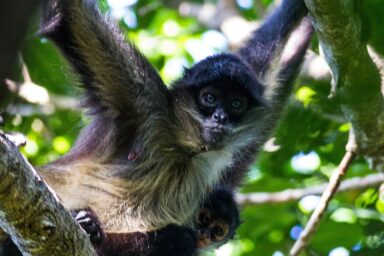|
Listen To This Story
|
PICKS are stories from many sources, selected by our editors or recommended by our readers because they are important, surprising, troubling, enlightening, inspiring, or amusing. They appear on our site and in our daily newsletter. Please send suggested articles, videos, podcasts, etc. to picks@whowhatwhy.org.
These Gorgeous Photos Capture Life Inside a Drop of Seawater (Maria)
The author writes, “In every drop of water is a hidden world. Scuba divers can’t see it through their masks; neither can snorkelers swimming among the coral reefs. To really enter this world, you need to look through a magnifying lens. There you’ll see a vast array of vanishingly small plankton, including crustaceans known as copepods. … ‘Copepods are the most numerous animal on the planet,’ says Chad Walter, an emeritus researcher at the Smithsonian’s National Museum of Natural History who has been studying them for 40 years. ‘People think insects are. But 70 percent of the planet is covered by water, and copepods inhabit all of that.’”
What Trump Testified in E. Jean Carroll Case Will Turn Your Stomach (Sean)
From Occupy Democrats: “Part of Donald Trump’s October deposition has been unsealed in the case against him by E. Jean Carroll, who alleged that he raped her in a department store — and then damaged her career by lying about it and defaming her. His responses paint a horrifying picture of a victim-blamer who simultaneously denies the crime — and then says that Carroll ‘loved it.’”
Wisconsin Judge Dismisses Complaint Against GOP Fake Elector (Reader Steve)
The author writes, “A Wisconsin judge on Tuesday dismissed an open records complaint against a Republican member of the Wisconsin Elections Commission who served as a fake elector for former President Donald Trump. Allegations that the elections commission violated the state open records law by wrongly withholding documents will go forward, but claims made against Commissioner Robert Spindell were dismissed by Dane County Circuit Judge Jacob Frost.”
After Weeks of Violent Protests, What Is Happening in Peru? (Dana)
From Al Jazeera: “Thousands of protesters in Peru have converged in the capital Lima to show support for ousted former President Pedro Castillo and to demand the resignation of current President Dina Boluarte. The mass demonstrations on Thursday aim[ed] to keep up the pressure against the government, with protesters also calling for the dissolution of parliament and fresh elections. Counterprotests already underway are rejecting those demands, a sign of divisions wracking the country. Here is what to know about the unrest.”
US Seeks Perfect ‘Reese’s Cup’ Mix of Farming and Solar Panels (Laura)
From Bloomberg Law: “Flat, sunny acres of land are prime real estate for solar energy developers who hold a key role in helping the US meet its climate goals. But developers are often eyeing fields of wheat, corn, and hay; ranches roamed by cattle and sheep; and plots bursting with berries and lettuce. If built there, solar panels can level farms that feed the country. Yet federal energy officials and university researchers believe there’s no conflict. The Energy Department is scaling up the emerging field of ‘agrivoltaics,’ which seeks innovations in both solar technology and farming techniques that can produce clean energy and food at the same time, on the same plot of land.”
Cougars Are Heading East. We Should Welcome Them. (DonkeyHotey)
The author writes, “Cougars once had the run of the continent, ranging far and wide. But they were virtually eliminated in the Eastern United States by the early 1900s (except for a small population that survives in Florida), victims of bounty hunting and habitat loss. In recent decades, their numbers in the Western United States, where they were also once targeted for eradication, have rebounded, and now these big cats, also known as mountain lions, panthers and pumas, are slowly moving east. … Their return would most likely result in healthier forests, safer roadways, less zoonotic disease and, in turn, healthier human communities.”
Radio Signal From Ancient Galaxy Is Most Distant Ever Detected (Sean)
The author writes, “A huge radio telescope in India has picked up a radio signal from the most distant galaxy ever recorded — more than eight billion years ago. Detecting radio signals from distant galaxies is difficult as the signals become weaker the further away a galaxy is from Earth, making it tricky for current radio telescopes to pick up.”




